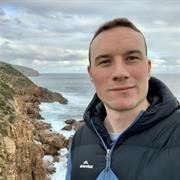
Dr. Lukas Schuster
Details
-
Department: School of Science
-
Campus: City Campus Australia
-
lukas.schuster@rmit.edu.au
Open to
- Collaborative projects
- Industry Projects
- Masters Research or PhD student supervision
About
Dr Lukas Schuster is a research fellow specialising in environmental sciences, with a strong focus on natural climate solutions and ecosystem restoration. His research aims to quantify and enhance the carbon sequestration potential and biodiversity outcomes of aquatic ecosystems, particularly in the context of climate change mitigation and sustainable management.
His current projects include:
-
Assessing the carbon and biodiversity benefits of restoring degraded teal (freshwater) and blue (coastal and marine) carbon ecosystems, using carbon flux measurements and environmental DNA (eDNA) techniques.
-
Testing the effectiveness of constructed floating wetlands in reducing greenhouse gas emissions from wastewater lagoons, supporting the water sector’s goal of reaching net-zero emissions by 2035.
-
Evaluating sustainable management practices for farm dams to improve water quality, enhance farm productivity, and reduce greenhouse gas emissions.
-
Investigating the microbial drivers of greenhouse gas emissions from farm dams, and how management interventions influence microbial communities that regulate these emissions.
Research fields
- 41 Environmental sciences
- 310703 Microbial ecology
- 310405 Evolutionary ecology
- 3103 Ecology
UN sustainable development goals
- 11 Sustainable Cities and Communities
- 13 Climate Action
- 14 Life Below Water
- 15 Life on Land
- 17 Partnerships for the Goals
- 9 Industry, Innovation and Infrastructure
Academic positions
- Research Fellow
- RMIT University
- Centre for Nature Positive Solutions
- Melbourne, Australia
- 17 Feb 2025 – Present
- Postdoctoral Research Fellow
- Deakin University
- Melbourne, Australia
- 14 Aug 2021 – 13 Feb 2025
Non-academic positions
- Teaching Associate
- Monash University
- Melbourne, Australia
- 11 Feb 2018 – 17 Feb 2022
Teaching interests
Lukas has a solid teaching background across undergraduate and postgraduate levels, having taught at Monash University and the University of Vienna. His teaching portfolio covers marine evolutionary ecology, molecular biology, microbiology, and biochemistry.
He emphasizes active learning and scientific inquiry, mentoring student-led research projects and fostering critical thinking skills. Lukas is experienced in providing both technical training in molecular techniques and data analysis, as well as conceptual guidance to support student development.
Research interests
Lukas' research focuses on the ecological and biogeochemical processes that underpin climate change mitigation and ecosystem restoration, with a particular emphasis on freshwater and coastal aquatic environments. His work bridges applied environmental science, microbial ecology, and carbon cycling, aiming to develop scalable, evidence-based solutions for climate change resilience and biodiversity conservation.
His recent work centres on the role of teal (freshwater) and blue (marine and coastal) carbon ecosystems as natural climate solutions (e.g., Schuster et al. 2024). These ecosystems, including wetlands, saltmarshes, and farm dams, play a critical role in carbon sequestration and greenhouse gas dynamics. Lukas leads interdisciplinary projects that assess the carbon and biodiversity co-benefits of restoring these systems, using tools such as carbon flux monitoring, molecular ecology (eDNA and microbial sequencing), and remote sensing.
Lukas also works closely with stakeholders in the water sector and agriculture, testing interventions such as:
-
Constructed floating wetlands to reduce methane and nitrous oxide emissions from wastewater lagoons.
-
Sustainable farm dam management, including livestock exclusion and revegetation, to improve water quality, farm productivity, and GHG emissions reduction.
In parallel, his research on microbial ecology investigates the microbial community dynamics that mediate biogeochemical cycles. Using metabarcoding and multivariate statistical approaches, he studies how management interventions—like dam restoration or vegetation change—influence microbial assemblages and their functional roles in greenhouse gas production or mitigation.
This integrative approach, from microbes to management strategies, informs practical policy outcomes while contributing to our fundamental understanding of ecosystem processes in a changing climate.


